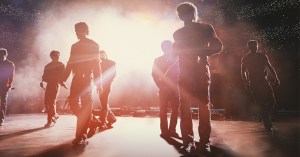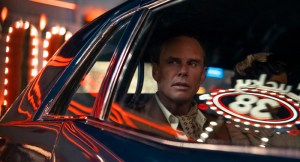Mel Rodriguez’s Five Favorite Films
by Kerr Lordygan | December 16, 2015

Getty Images / Astrid Stawiarz / Stringer
Mel Rodriguez is in three of the best-reviewed TV shows of the last couple years: Better Call Saul (Marco), The Last Man on Earth (Todd), and Getting On (Patsy). His characters — when their shows’ titles are murmured around the water cooler — evoke reactions like, “Ohhhhh [insert character name here]! I love him!” But his new film, Fat, features Rodriguez in a very real, naturalistic performance that is sure to earn him new fans. Rodriguez spoke to us about his favorite movies with passion and enthusiasm; it’s no wonder his likability is being noticed around the world. Here are five of his favorite films:
 99%
99%
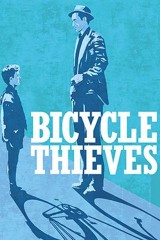
I really love Bicycle Thief. That just reminds me of my relationship with my father. My mother — they were divorced and I was raised mostly by my father. We grew up really poor. Something about that film really strikes a chord in me real deep. I remember [when I first saw it],I think I was in college and I had just left home. It was part of film studies class. We were told to watch it and I remember getting really emotional watching it. I guess it just really struck a chord because it made me realize everything my father had gone through to support us and to be there for us. I just remember that relationship, that father/son relationship and him loving his father so much and the end — his father just constantly trying so hard to support the family and make ends meet, and really not being able to pull it off. Poverty sucks, you know what I mean? And then in the end, him having to kind of resort to something that goes completely against his character, really, in order to provide for his family. And those moments of just pure humiliation, as a man, to try to provide for your family.
I remember times like that with my dad and it just really hit close to home. I remember missing my dad because I was in New York. I was away from home for the first time and getting a real clear idea of what my father had gone through to provide for me. I think when you’re in the day-to-day and living it, you don’t have that objectivity, and you’re not able to step back and see the big picture. Then sometimes these really great movies are able to that for you. They’re kind of able to strike these chords in you and illuminate things for you. I think that’s what the Bicycle Thief did for me.
 93%
93%
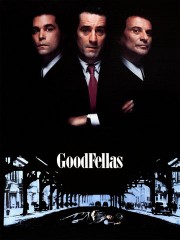
I grew up in kind of a rough neighborhood and there was kind of this whole gangster thing, too. I think that’s the opening line: “As far back as I can remember I always wanted to be a gangster.” And I think there was a part of me that felt the same way. I just loved Robert De Niro’s work, all those guys really. Man, the acting, and everything about that movie — almost flawless film. And I’ve loved all of Scorsese’s films. Just his working relationship with Robert De Niro, from Mean Streets on; there are so many movies that I love with the two of them. I feel like everything kind of comes together in Goodfellas in some way. Goodfellas has kind of got it all. That was probably one of my favorite films as a kid, so I carried a picture of Goodfellas in my wallet. With De Niro and Pesci and Liotta, it was like, you know, the trinity [laughing]. I mean, really, Goodfellas was kind of like my Star Wars [laughing].
Really just the pacing of that film, everything, just how realistic. And at times it’s just jarring how violent it is. And hilarious too. It’s f—ing hilarious. I mean, I know it’s not funny that you would wrap a telephone cord around a guy’s neck. That’s not funny at all! The whole situation is terrible! But I think on some level, really, you kind of care for these guys and I think that’s what Scorsese is able to do in his films, is make these guys so human that we are able to somehow relate to them and, on some level, even kind of root for them, even though some of the stuff they do is just really despicable. I mean, the stuff that Joe Pesci does is just awful and I don’t think you really necessarily root for him; he’s kind of a hot head.
The thing is, obviously, I know these things are bad. I do know how life can go one way or another, and that it’s not all just black and white, and there are many different situations and twists and turns in life. I feel these things sometimes and say, “Oh wow, I knew a guy like that. And I knew a guy like that.” And so I am very into gangster movies just because I feel, in some ways, I don’t think I have the heart for it, honestly. I’d have a nervous breakdown as a gangster. I’d be a very nervous gangster. I’d be the gangster that pops a lot of Klonopin.
RT: That’s your next movie, or sitcom.
Yeah totally [laughing]! You know, Miami was just fraught with this kind of stuff in the 1980s. I remember telling a buddy that you’d see a guy adding these really palatial additions to his really modest home in the southwest area of Miami. And you know, these kinds of houses, you’d be like, “Oh, you know, so-and-so got into selling drugs,” and they’d pop up all over the neighborhood. Then all of a sudden, construction would stop on one, it would stop for months. And you’d go, “Oh, well so-and-so went to jail.” That’s kind of how the 1980s were in Miami. But back to Goodfellas. It’s great and the pacing. And it all it seems very real.
 98%
98%
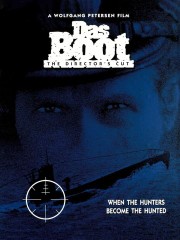
I love Das Boot just because it’s a real keen movie. But I’m doing this show, The Last Man on Earth too, and there’s this thing where [my character] Todd is kind of crumbling. He’s got all this stuff on his plate; he’s just kind of starting to fall apart a bit. And there’s this one scene in Das Boot, where one of the guys realizes he is going to die, just losing it. Something about this one actor — he’s able to convey every single bit of claustrophobia and fear, and man, he’s able to convey all that on his face somehow in a moment. Literally, I think the scene is probably about two minutes long, and you just feel everything, man. You know these guys are about a thousand feet underwater, and literally you take that ride with him. I think some of the performances are just so unbelievable.
 92%
92%
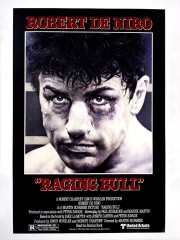
I think [the performances are] what it is for me with films. Like Raging Bull, for instance. It’s just beautiful. I love Robert De Niro and how he was just able to embody Jake LaMotta that way. That was inspiring to me. I remember thinking, “Oh wow, this guy is just like a chameleon.” He’s just able to take on the spirit of someone and become this person. I was really fascinated by that. The fact that he went on to gain all this weight for LaMotta in the later years, and his relationship with his brother; it’s so powerful. I had a younger brother. I just really related to that. And their relationship, how they just love each other so much, but do such awful things to each other sometimes. And the whole story itself, the life of a fighter. What makes a fighter and what makes a fighter kick?
I’m also a huge boxing fan. I box. That was something that I considered doing as a profession at one point, until I got punched really f—ing hard [laughing]. It’s just an awful f—ing feeling, and it sucked. And I was like, “I’m not going to do this for a living; there’s no way [laughing].” And with that, my whole attitude changed about that really quick. But I have so much respect for what those guys do, the fact that these guys — I mean, they literally fight for a living, and they train so hard. I’ve been in the gym and I see what these guys do.
It’s also a poverty thing, too, in a lot of ways. I don’t think a lot of really wealthy people jump in the gym and decide they want to be a boxer. It’s usually these guys; “I’m gonna make something for me. I’m gonna make something for my family. I’m gonna do it by training six, seven, eight hours a day and getting in the ring with one other man. And f—ing laying it all on the f—ing line.” I have a great respect for that.
It’s one of those movies you can feel. It’s visceral that way. And the dialogue just seems to come almost effortlessly. So much like life; it really is like you are watching this piece of life. I really love films like that.
 78%
78%
Pacino in Scarface. That’s another one, just because it was where I was from. I am half Cuban American. That wasn’t the story necessarily of Cuban Americans but I know a lot of the guys that I grew up with and a lot of the people I grew up with felt that way. Being first generation — you know people had a lot to prove. And God, I feel that movie is so sleek, and very much what Miami is. It was really cool. It was a really interesting time when the Mariel boatlift happened and Castro emptying out his prisons and insane asylums. It was a crazy time. I think crime went up by 200 percent in Miami. I mean, literally we had killers on the street and it was a f—ing nutty time. I remember somebody saying that it’s funny that I ended up doing comedy, and I was so into all these other super hardcore dramatic films. But I just remember Al Pacino doing an interview once and him saying that he was — while he was doing that — he kinda really dropped into the role and became this really kind of vicious guy to play Tony Montana. And he said he was coming out of his house one day, and I guess some guy’s doberman had gotten loose and he was kind of “in it” on his way to work — and this doberman came up to him and he realized the doberman was going to attack. And he just kind of planted himself — you know, all Tony Montana — and just f—ing was like “Hey!” And the dog kinda turned around and whimpered and ran away [laughing]. And he was like, “Me, Al Pacino — I would have freaked out but I was just in this thing and I was really in — and this dog comes in… ‘This guy’s f—ing danger, you know? Stay away.'”
RT: Benefits of method acting.
Yeah totally [laughing]. I loved all those guys that did that stuff, man. I really wanted to do that. It’s so funny, I really, I wanted to be that, I wanted to live that, as an actor. If it’s Midnight Cowboy, I’m going to go be homeless for a month and all that stuff. I was so into to that, the science behind the method you know. It just really fascinated me, man. It just seemed like so much fun.
RT: But it can be painful too.
Yeah, and then I realized now it could probably be torturous. I think I was young and a little naive thinking that. I look at a guy like James Gandolfini who had to carry around all that darkness day in day out. Now, I’m on a comedy; we just kind of laugh on set all the time. It’s very light for the most part. Some of it is a little heavy, but for the most part it’s really, really light. I realize, “Oh, I’m gonna go home. I am able to just hold my girl and give my wife a kiss, just hang out and watch TV,” and everything is really kind of light. I can’t imagine going to work where you’re playing this kind of mob boss killer who knows that the FBI is hot on his f—ing tail, and can’t trust anyone. Day in and day out, playing this f—ing thing. I know that, energetically, it’s gotta do something to your f—ing insides. Maybe that’s — God knows — but maybe that’s why we lost him so soon, but it’s heavy s—. It’s really heavy. Now looking back I certainly don’t think I want to do that. It’s too much. And I certainly don’t want to bring that sort of thing home.
Fat is now open in limited release and available on VOD and iTunes.




